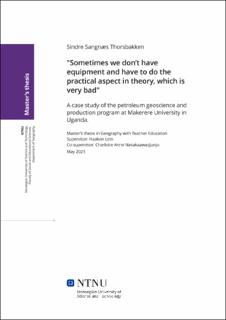| dc.contributor.advisor | Lein, Haakon | |
| dc.contributor.advisor | Nakakaawa-Jjunju, Charlotte Anne | |
| dc.contributor.author | Thorsbakken, Sindre Sangnæs | |
| dc.date.accessioned | 2023-07-20T17:21:30Z | |
| dc.date.available | 2023-07-20T17:21:30Z | |
| dc.date.issued | 2023 | |
| dc.identifier | no.ntnu:inspera:142257899:37630863 | |
| dc.identifier.uri | https://hdl.handle.net/11250/3080619 | |
| dc.description.abstract | Uganda fant kommersielle mengder olje i Albertine-regionen i 2006. Produksjonen av olje kan ha helhetlige sosiale og økonomiske konsekvenser for Uganda, men også Ugandas innbyggere, i form av skapelsen av arbeidsplasser og forbedret levestandard. Utvikling av Ugandas olje- og gassressurser byr på utfordringer på grunn av en global trend bort fra fossilt brensel mot fornybare energikilder. For å sikre at ugandiske borgere blir ansatt i den relativt nye og voksende olje- og gassindustrien, innførte regjeringen i Uganda (GoU) reguleringslovverk (local content) som regulerer rekruttering og opplæring i sektoren.
Denne case-studien undersøker hvordan petroleumsgeovitenskap og produksjon (PG&P) programmet ved Makerere Universitet i Uganda er utformet for å sikre at kandidatene deres blir ansatt i den innenlandske olje- og gassektoren etter endt utdanning, og hvordan reguleringslovverket bidrar til å sikre sysselsetting av ugandisk arbeidskraft. Datainnsamlingen var basert på intervjuer med studenter, ferdigutdannede og forelesere ved PG&P-programmet, i tillegg til en gruppediskusjon med studenter. Videre ble relevante politiske dokumenter og litteratur undersøkt for å diskutere og fastslå påstander fra deltagerne. I tillegg presenterer studien deltakernes syn på; mobiliteten og evnen til ferdigutdannede fra programmet til å bli ansatt i andre sektorer; mulig innvirkning av olje- og gassektoren på utviklingen i Uganda; hvordan energiomstillingen kan påvirke olje- og gassektoren i Uganda.
Resultatene viser at PG&P-programmet mottar begrenset finansiering fra GoU og lider av begrenset støtte og samarbeid med olje- og gassektoren. Dette har implikasjoner for elevenes opplæring og kjøp av nytt og relevant utstyr for å forbedre kvaliteten på utdanningen. Mineralsektoren og vannsektoren ble fremhevet som andre mulige arbeidsgivere for PG&P-kandidatene. Selv om både studenter og nyutdannede var optimistiske rundt hvordan olje- og gassektoren kunne påvirke utviklingen av Uganda basert på deres motivasjon til å starte på PG&P-programmet, var det også skepsis på grunn av korrupsjon og den begrensede absorpsjonen av nyutdannede i olje- og gassektoren. Alle deltakerne trodde at energiomstillingen vil skje i Uganda på et tidspunkt, men at mangelen på investeringer og teknologi i Uganda bremser prosessen. Selv om Uganda fant olje i 2006, startet den første boringen etter kommersiell olje i 2023. Det betyr at olje- og gassindustrien i Uganda er ung og fortsatt i utvikling. | |
| dc.description.abstract | Uganda found commercial oil in the Albertine region in 2006. The production of oil can have social and economic consequences for Uganda as a whole, but also for its citizens, in terms of employment creation and improved living standards. However, developing Uganda’s oil and gas resources presents challenges given a global trend away from fossil fuels towards renewable energy sources. To ensure that Ugandan citizens get employed in the relatively new and growing oil and gas sector, the Government of Uganda (GoU) imposed local content policies which regulate recruitment and training in the sector.
This case-study investigates how the petroleum geoscience and production (PG&P) program at Makerere University in Uganda is designed to ensure that their graduates get employed in the domestic oil and gas sector after graduation, and how the domestic local content policies is securing employment of Ugandan labor. The data collection was based on interviews with students, graduates, and lecturers at the PG&P program, in addition to a group discussion with students. Furthermore, a review of relevant policy documents and literature was conducted to discuss and ascertain claims made by the participants. In addition, the study presents participants’ views on; the mobility and ability of the programs graduates to get employed in other sectors; possible impact of the oil and gas sector on development in Uganda; how the energy transition might impact the oil and gas sector in Uganda.
Results show that the PG&P program receives limited funding from the GoU and suffers from limited support and cooperation with the oil and gas sector. This has implications for the students training and purchase of new and relevant equipment to improve the quality of education. The mineral sector and water sector were mostly highlighted as other possible employers for the PG&P graduates. Although both students and graduates were optimistic about how the oil and gas sector could impact the development of Uganda based on their motivation to enroll in the PG&P program, were there also skepticism because of corruption and the limited absorption of graduates in the oil and gas sector. All participants thought that the energy transition will happen in Uganda at some point, but that the lack of investments and technology in Uganda slows down the process. Even though Uganda found oil in 2006, the first drilling for commercial oil started in 2023. This means that the oil and gas industry in Uganda is young and still developing. | |
| dc.language | eng | |
| dc.publisher | NTNU | |
| dc.title | Sometimes we don’t have equipment and have to do the practical aspect in theory, which is very bad | |
| dc.type | Master thesis | |
